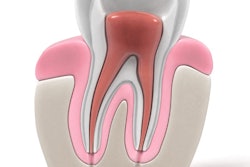
SAN FRANCISCO - Studies evaluating and comparing various options for pain control and management for endodontic patients were presented at the 2016 American Association of Endodontists (AAE) annual meeting. Topics included comparisons of liposomal bupivacaine with conventional bupivacaine and new formulations of ibuprofen.
Pain control in symptomatic teeth
Studies have found prolonged pain relief and reduction in opioid use for up to 72 hours postoperatively in patients who received postsurgical infiltration injections with liposomal bupivacaine.
In a prospective study presented at AAE 2016, Kristy Bultema, DDS, and colleagues at the Ohio State University (OSU) College of Dentistry compared bupivacaine HCl with liposomal bupivacaine for endodontic pain control in patients who presented with moderate to severe pain and who also had untreated symptomatic irreversible pulpitis.
The study included 100 adult patients from the school's dental clinic who were divided into two groups. One group received 4 mL of liposomal bupivacaine (Exparel, 13.3 mg/mL), and the second group received 4 mL of 0.5% bupivacaine HCl with 1:200,000 epinephrine by infiltration following injection with 1.8 mL of 2% lidocaine with 1:100,000 epinephrine via infiltration or inferior alveolar nerve block. At the end of the appointment, patients were given ibuprofen (600 mg), acetaminophen (500 mg), and a prescription for hydrocodone and acetaminophen (5 mg hydrocodone/325 mg acetaminophen).
Patients received a diary for the day of the appointment and three days postinjection to record tooth numbness, lip numbness, pain levels, and analgesics (non-narcotic and narcotic) utilization.
No significant differences
No significant differences were found between the two groups regarding tooth numbness, pain, and narcotic and non-narcotic pain medication use. A statistically significant difference in lip numbness was found in the first three days for the liposomal bupivacaine group.
Liposomal bupivacaine did not provide prolonged pain control, nor did it reduce analgesic consumption when used for untreated posterior symptomatic vital teeth when compared with bupivacaine HCl, the researchers concluded.
New ibuprofen formulation and odontogenic pain
In another study presented at AAE 2016, researchers from University of North Carolina at Chapel Hill presented results on a new formulation of ibuprofen that could have benefits over the standard formulation.
Ibuprofen acid, a nonsteroidal anti-inflammatory drug (NSAID), is considered the gold standard for managing odontogenic pain, according to a clinical trial by Tanjit Taggar, DMD, and colleagues. In this study, the researchers noted that ibuprofen sodium dihydrate, a newer formulation of ibuprofen, could provide faster pain relief. The researchers compared conventional ibuprofen acid and ibuprofen sodium dihydrate (n = 60).
The study included patients with moderate to severe pain from symptomatic irreversible pulpitis and symptomatic apical periodontitis. Baseline measurements included pain intensity reported on a 100-mm visual analog scale and mechanical pain thresholds on the symptomatic and contralateral tooth using a digital bite force transducer.
Patients were given 400 mg of ibuprofen acid (Advil) or an equivalent dose of 512 mg of ibuprofen sodium dihydrate (Advil Sodium). They were instructed to stop a stopwatch when they experienced a 50% decrease in pain intensity. Measurements of pain intensity and mechanical pain thresholds were collected 60 minutes after administration of the analgesic.
Faster onset of pain relief
The study showed that ibuprofen sodium dihydrate has a faster onset of pain relief, a higher decrease in pain intensity, and lower mechanical allodynia than conventional ibuprofen acid.
"Endodontists may now have a tool that provides faster and more effective pain relief for their patients," the researchers concluded.
They noted that these results may prevent the need for additional analgesics and limit the side effects associated with NSAIDs.
Exparel evaluation
A third pain management study, also by researchers at the OSU University College of Dentistry, noted that earlier studies have shown the potential for using Exparel, an injected slow-release bupivacaine solution, to extend the postoperative benefits of numbness for several days.
This prospective study, by Brandon Glenn, DDS, and colleagues, compared conventional bupivacaine and Exparel for postoperative numbness and pain in symptomatic patients diagnosed with pulpal necrosis who were experiencing moderate to severe preoperative pain.
Exparel uses DepoFoam to deliver microscopic chambers containing small amounts of bupivacaine at concentrations of 13.3 mg/mL. Exparel has not been approved by the U.S. Food and Drug Administration (FDA) for use as a nerve block anesthesia, the researchers noted.
The study included 100 emergency patients at the school's clinic who were treated with endodontic debridement and antibiotics and given a supply of ibuprofen (600 mg) and acetaminophen (1,000 mg). Patients were prescribed narcotic pain medication as needed.
Patients were divided into two groups. At the end of the appointment, patients received a 4.0-mL buccal infiltration of either 0.5% bupivacaine or 4.0 mL of Exparel. Patients recorded their level of numbness and pain over the next five days, as well as their use of pain medication. Success was defined as no or mild postoperative pain (≤ 54 mm on a 170-mm visual analog scale) and no narcotic use.
Exparel comparable to bupivacaine
The success rate was 29% for the Exparel group and 22% for the bupivacaine group, with no statistically significant difference (p = 0.4684) between the groups. Patients in the Exparel group reported significantly more soft-tissue numbness through postoperative day 2, while tooth numbness was not different on a statistically significant basis.
For patients diagnosed with pulpal necrosis experiencing mild to moderate preoperative pain, a 4.0-mL infiltration of Exparel following endodontic debridement did not result in a statistically significant increase in success compared with bupivacaine, the study authors concluded.



















